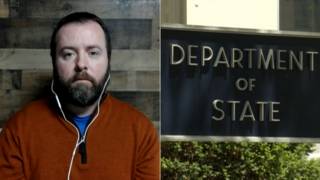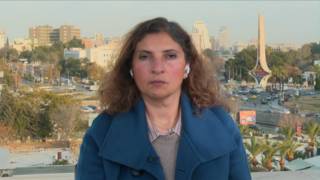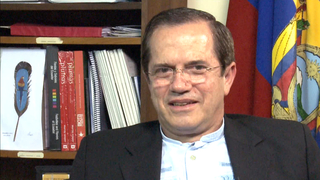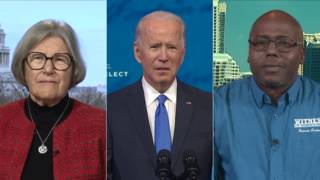
Related
Topics
Oil prices have risen almost $15 a barrel since the year began, briefly topping a record $58 a barrel on Monday. While the Bush administration is fond of blaming oil prices on OPEC, the group says the pricing is beyond their control. We take a look at the current state of oil with Jim Paul of the Global Policy Forum and Michael Klare, author of “Blood and Oil.” [includes rush transcript]
When you ask most people in the world why the US invaded Iraq, the majority would probably include oil in their answer. But now, two years after the invasion began, oil prices have not only not gone down for U.S. consumers–they have actually gone up. And in dramatic form.
Oil prices have risen almost $15 a barrel since the year began and gas is costing US motorists an average of $2.15 a gallon. Yesterday, oil prices briefly topped $58 a barrel, causing some shock waves on the markets. The Bush administration is fond of blaming oil prices on OPEC–the Organization of Petroleum Exporting Countries. But OPEC officials say the pricing is beyond their control. So what is driving this so-called crisis? To discuss this, we are joined by two guests.
- Jim Paul, Executive Director of Global Policy Forum. He is based at the United Nations and monitors events there. He has authored a number of reports on oil companies and Iraq.
- Michael Klare, Professor of Peace and World Security Studies at Hampshire College. His latest book is called “Blood and Oil: The Dangers and Consequences of America’s Growing Dependency on Imported Petroleum.”
Transcript
AMY GOODMAN: To discuss this we’re joined by two guests in our studio. Jim Paul is here. He’s the Executive Director of Global Policy Forum. He’s based at the United Nations and monitors events there. He’s authored a number of reports on oil companies in Iraq. They can be found at www.globalpolicy.org. On the line with us from Massachusetts, Michael Klare, Professor of Peace and World Study — World Security Studies at Hampshire College. His latest book is called Blood and Oil. We welcome you both to Democracy Now! Jim Paul, let’s begin with you. What’s going on? Why are these prices soaring?
JIM PAUL: Well, Amy, there’s two different elements to this. One is the temporary conjuncture in the oil markets which include things like the refinery fire in the United States and other factors like that. The situation in Iraq is also an element of that type. But, more fundamentally, the markets are moving higher and higher because it looks like the world is actually running out of oil. There’s been a big dispute about this in the oil industry for a long time; but the Unocal takeover is one example of this. The oil companies can’t find more oil, and so they’re buying other companies in order to increase their reserves. This is, I think, the most explosive aspect to this issue.
AMY GOODMAN: Professor Michael Klare, do you agree?
MICHAEL KLARE: Yes. I generally agree. I think we have to even elaborate on what Jim Paul said. We’re facing a structural change in the oil and energy industry that’s likely to be permanent, and that structural change is that the output cannot keep up with demand; and what you have to add to the equation is surging demand for oil around the world, especially in the United States and China and Japan, Europe and India. And the global oil industry is simply not capable of satisfying this rising level of demand and won’t be so far as we could tell for the rest of the petroleum era. So there’s going to be intense competition. And then you add on top of that political instability in Venezuela and Nigeria and Angola and Saudi Arabia and Iraq, and you can understand why prices are so high.
AMY GOODMAN: Did the invasion of Iraq have any effect?
MICHAEL KLARE: Certainly, it has, because the invasion of Iraq which was supposed to produce greater stability in the Persian Gulf, and therefore facilitate higher levels of output has had the opposite effect. It has promoted instability in the region. It’s invited a massive insurgency, which regularly attacks oil facilities and pipelines. And it’s led to terrorism and instability in Saudi Arabia and other countries in the region. So there’s no greater stability, and when things become tormented like this, oil deliveries drop.
AMY GOODMAN: There is a lot of blaming of OPEC. Is OPEC in control of this, Jim Paul?
JIM PAUL: I don’t think OPEC is in control of it. These are — as Mike was just saying, these are forces that are much bigger than OPEC. OPEC 's own production is pretty high in terms of its capacity right now. Only Saudi Arabia has a very, very small amount of swing production left; and so I don't think we can blame it on OPEC at all.
AMY GOODMAN: So what’s going to happen right now, Michael Klare, around this issue?
MICHAEL KLARE: You’re going to see oil and energy become the central political issue of the coming future. I sense as I travel around the country that people in the United States are becoming much more aware of the issue of peak oil that Jim alluded to before, the notion that we’re reaching the moment when global oil output will reach its peak or maximum level and then drop, making oil less and less available, more competition, more stress. People are beginning to understand that this will affect everything in America because we’re so dependent on oil that it’s going to challenge our way of life; and I think people are beginning to understand this.
AMY GOODMAN: Jim Paul, does global warming play a role?
JIM PAUL: Yes, it certainly does. It’s well understood that the carbon emissions that result from burning this stuff are causing global warming, or are a main cause of it. And so, it’s very likely that, as understanding of this increases and political momentum develops for regulating it, there are going to be regulatory rules that are going to cut down on the possibility of producing and burning petroleum; and this is one of the many factors that has the markets worried and the companies themselves, even though they’re making record profits right now.
AMY GOODMAN: What about Venezuela, Michael Klare? You mention it, one of the major oil suppliers in the world. What role does oil play in the U.S. while many have said trying to topple the President Hugo Chavez?
MICHAEL KLARE: Well, this is part — Amy, this is part of a global struggle. The United States under the Bush-Cheney administration is committed to perpetuating our dependence on oil. And the only way we could do that is by procuring more and more of the rest of the world’s oil. I mean everywhere: Africa, Latin America, the Middle East, Central Asia. We need more and more of all of those places’ oil, and any time somebody stands in the way of that, like Hugo Chavez, and says, 'Wait a minute. We want to control our own oil destiny. We want to produce it at a rate that's good for our economy, and, in fact, we want to use our oil to boost regional Latin American development, rather than satisfy American consumers,’ this is a direct assault on the oil-driven foreign policy of the Bush administration. So it’s hardly surprising, I think, that the administration is seeking to undermine Hugo Chavez, and I’m sure they’re working on that night and day.
AMY GOODMAN: Talking about other conflict areas, Jim Paul, what about Sudan?
JIM PAUL: Well, Sudan is a place where U.S. and China have more or less come head-to-head. It’s one of a quite a few countries where that’s been happening. The Chinese have an enormous interest in developing their external oil resources, because they need to import maybe as many as five million barrels a day from the Middle East area. And they started developing oil in Sudan, and the U.S. and the U.K. companies didn’t like that. They were shut out. So we have a very, very tough and very nasty, virtually genocidal conflict going on in Sudan; and I think quite a bit of it can be traced to the conflicts of oil interests there.
AMY GOODMAN: Michael Klare, what about the Senate voting to drill in the Arctic National Wildlife Refuge?
MICHAEL KLARE: This, I think, is a form of delusion. It is smoke and mirrors to distract the American public from the reality of the Bush plan. I think Americans understand that our dependence on imported oil is a threat to our well-being. I think that’s well understood. So Bush says, 'I have a solution to that. We'll drill in ANWAR and become independent.’ Well, he’s lying. Because there’s no way that ANWAR, even if it has all the oil they claim it does, is going to diminish our dependence on imported oil one bit. We will continue to be ever more dependent on imported oil. But it’s a way of distracting the public from the reality of our predicament.
AMY GOODMAN: What, Michael Klare, are the alternatives?
MICHAEL KLARE: The alternatives are to reduce our dependence on petroleum, period. There’s no way you could separate our dependence on foreign petroleum from our dependence on petroleum in general. We simply have to find ways to reduce our consumption; and that means primarily in transportation, because that’s where we use most of our oil. It means driving fewer miles or driving more fuel-efficient vehicles like hybrids or very fuel-efficient diesels. There isn’t any other solution. Oh, and public transit, of course.
AMY GOODMAN: In a piece you did for the Los Angeles Times on Sunday called, “Arctic Drilling is No Energy Answer,” you mention the Cheney report, the whole report on energy policy (which we haven’t heard very much about lately), the litigation over it, the demand that he reveal who it was he consulted with. But what ultimately came of that? Is it a push for dependence on oil or not?
MICHAEL KLARE: Absolutely. This is a blueprint for the preservation of the existing energy paradigm in the United States, which is big oil, big coal, nuclear power, automobiles, and highways. That’s our existing energy paradigm, and the Bush plan is 100% committed to preserving that for another 20 years or so. And the only way they could do that is to increase America’s procurement of foreign oil. So what the Bush energy plan really is, is a blueprint to go after the oil of Colombia, Venezuela, Angola, Nigeria, Kazakhstan, Azerbaijan, Iran, Iraq, Saudi Arabia, and Kuwait. That’s the essence of the strategy; and I think the war in Iraq which followed that was partly shaped by that blueprint.
AMY GOODMAN: I want to thank you both very much for being with us, Michael Klare, Professor at Hampshire College, author of the book, Blood and Oil, and Jim Paul in our studio, Executive Director of Global Policy Forum.












Media Options